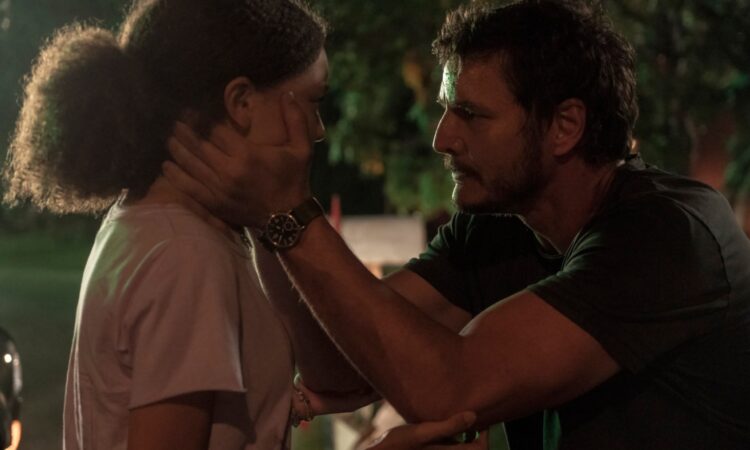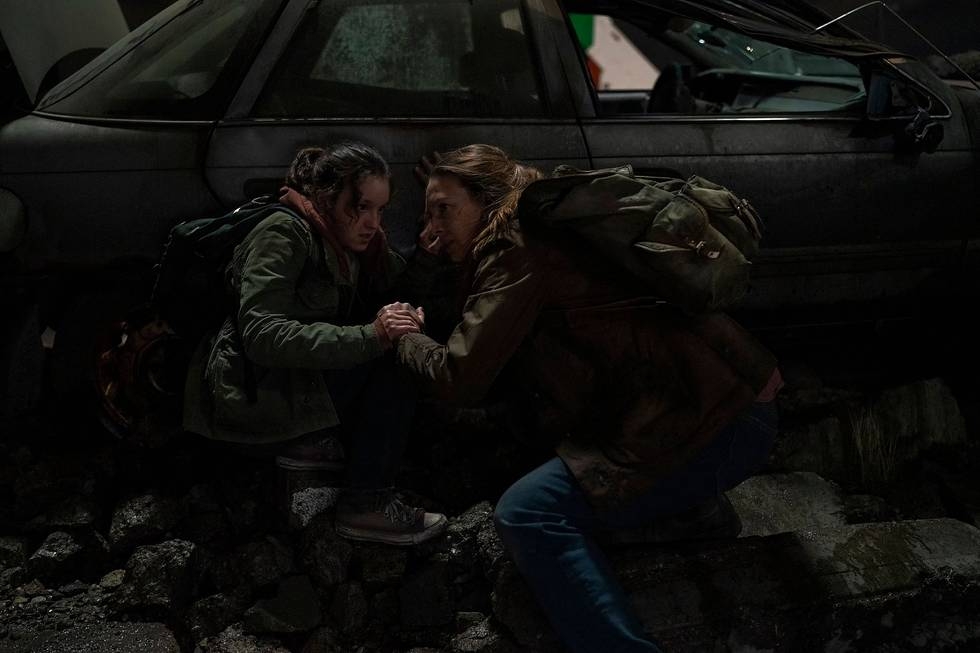
First things first: as I mentioned in my review of Season One, I’m not a gamer, have never played The Last of Us, and haven’t even watched a walkthrough video of it. So I’ll be discussing this episode, and all the ones to come, solely on the basis of how it works as a television show.
Judged on that basis, the super-sized “When You’re Lost in the Darkness” comes off pretty well. All of the season’s episodes are covering familiar ground in some way or other, but the premiere is perhaps crossing the most familiar of that ground. As I believe Leo Tolstoy once said, all zombie apocalypses are alike, but every post-apocalypse is unhappy in its own way. The episode eventually gets to the specific aspects of this one, and, more importantly, establishes Joel (Pedro Pascal), Ellie (Bella Ramsey) and Tess (Anna Torv) as interesting characters before the three of them set off on their dangerous mission. But before that, we have to watch civilization fall in the way it tends to in so many dystopian shows and movies.
Which isn’t to say that material is bad; just more generic than what’s to come, especially in later episodes. And even those sequences are well-executed, even if some of them, like Joel, Sarah and Tommy’s harrowing attempt to drive out of town before the mushroom people get them, feel a bit too much like a game level where you’re not allowed to play(*).
(*) I’m told that the drive is actually a cutscene in the game, and perhaps it feels different there coming between various levels; here, I felt like I was supposed to have a controller in my hand the whole time.
But the most compelling parts of the episode come before and after the nightmare that blankets the world over a late September weekend of 2003. Though Joel will become our central character, he is a supporting player for much of the 2003 scenes, which focus much more on his daughter Sarah, played by Nico Parker. In those scenes, Sarah comes across as a typical teenager — at times lost in her own head, at others outgoing and friendly and generous to others, including her dad and their neighbors. Parker (daughter of Westworld alum Thandiwe Newton) is excellent, holding the screen and establishing Sarah as someone we could plausibly root for over the series’ run.
This is, of course, not to be. Instead, creators Craig Mazin and Neil Druckmann are using those scenes to establish emotional stakes for Joel, and to make us deeply feel at least some of the pain he experiences when Sarah is shot by a panicked soldier on the night the world is wrecked. The man Joel has become when the story jumps ahead to 2023 is defined almost entirely by that tragic moment. He is emotionally closed-off and efficiently brutal, and when his new charge Ellie is threatened by a soldier late in the episode, he has a PTSD flashback to Sarah’s death and turns absolutely savage in the way he beats on this man.
Before we get to that violent escape from Boston, we first have to establish the state of America 20 years after the zombie uprising. It is a dreary, frequently nasty reality: a collection of fascist city-states run by FEDRA, the armed enforcers of what’s left of the government. Those lucky enough to have made it into one of the FEDRA enclaves have homes and food and safety, but not much more. There are mass hangings, and anyone infected with the fungus that destroyed civilization — like, say, the poor little boy who wanders into the Boston fortress right after the time-jump — is swiftly killed, their body burned to avoid further spread of the disease. It is not a shock to learn that there is a resistance group, the Fireflies, pushing back against the unyielding FEDRA rule.
Joel has no interest in that, though, or seemingly anything else. He has a secret route in and out of the city so he can smuggle in drugs and other supplies from the outside to make his life a little more tolerable. And he has a girlfriend in Tess who is badass in her own way. (We are introduced to her surrounded by armed men after a beating, yet it is clear that she is in command of the room the entire time, and would likely have found a way out of her predicament even if a conveniently-timed Firefly bomb hadn’t given her an escape route.) He is existing rather than living, haunted by the loss of his daughter even more than the loss of everything else he knew, with few goals beyond getting through the next day.
Then purpose arrives in the form of Ellie, a girl close in age to Sarah who needs passage out of the city. Like Tess, we meet her while she is someone else’s prisoner — in this case, Firefly leader Marlene (Merle Dandridge). Ellie is not as in command of the situation as Tess was, but we also quickly see that she is not afraid of being shackled to a wall by armed people who won’t explain why they want her. And when Marlene releases her into Joel and Tess’s custody, Ellie immediately begins to annoy her taciturn new male guardian with her curiosity about his apartment and his life. It is an instantly endearing entrance for Bella Ramsey, and a terrific contrast between Ellie’s outgoing personality and Pedro Pascal’s deeply-muted Joel.

Ellie (Bella Ramsey) and Tess (Anna Torv) in ‘The Last of Us’ series premiere.
The Boston scenes are notable for the lack of zombies, though we do get the disgusting imagery of a dead body absorbed into a wall of fungus when Joel and the others traverse an underground tunnel late in the hour. And we discover that Marlene needs Ellie to get to her other Fireflies out west because Ellie is somehow immune to the infection. The focus on people, and on the possibility of a cure, is a sign of how thoroughly FEDRA has wiped out the immediate threat, but also a marker of how The Last of Us — like The Walking Dead and other examples of the genre — can treat the undead as an unfortunate and dangerous fact of life, and other humans as the true monsters.
All in all, a promising start, though I will confess that I got to the end of it wondering why this was the thing that so many of my gamer friends were excited about. But “When You’re Lost in the Darkness” effectively sets up the world and our main characters, making all the goodness to come possible.
Some other thoughts:
* Television needs an intervention to prevent future title sequences like this one or the one used by The Lord of the Rings: The Rings of Power, which seem to have learned all the wrong lessons from the Game of Thrones opening credits. People don’t love that sequence because it’s two minutes of CGI forming different shapes; they love it because it’s two minutes of CGI telling a story of sorts by establishing the geography of the series as a whole and of individual episodes, changing periodically to introduce new spots on the map or prepare us to return to little-visited places like The Pyke. While the idea of the spores rising into something resembling a city — i.e., a metaphor for how the world as we know it has been consumed by the mushrooms — is clever, it’s still ultimately just a bunch of shapes, and not interesting enough to go on for as long as it does. I was already wishing the screeners had a Skip Intro button by the second episode.
* John Hannah does some nice work in the opening scene in 1968, playing a scientist who warns of this exact kind of climate change-aided catastrophe. His monologue could easily play as a bald exposition dump — a way to contextualize what is happening while we’re witnessing events from Joel and Sarah’s POV — but Hannah absolutely sells the innate fear of the thing.
* Pedro Pascal has many gifts as an actor, a lot of them on display in this episode. Regional accents — or, at least this regional accent — may not be one of them. The good news, depending on your point of view, is that Joe’s Texas accent appears intermittently in this episode and throughout the season, and largely disappears after a while.
* Finally, it’s always good to see Friday Night Lights alum Brad Leland in a Texas-set story, even if things end much more poorly for his character here than they did for Buddy Garrity on FNL.






